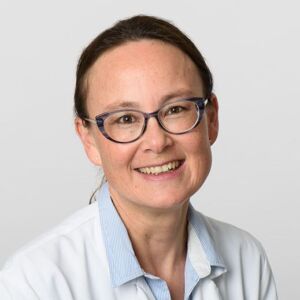In general, the risk of a woman developing breast cancer in the course of her life is around 12%. This disease is very rare in men. The risk of developing ovarian cancer over the course of a lifetime is around 1%. 5-10% percent of breast cancers and 15-20% of ovarian cancers are genetic. Changes in the genome (gene mutations) in the BRCA1 and 2 genes are thought to be responsible for around 50% of genetic breast cancers and around 25% of genetic ovarian cancers. In addition to BRCA1 and 2, other risk genes are now also known. However, specific preventive measures are not available for all known gene mutations.
BRCA-1 and BRCA-2 genes
The BRCA-1 and BRCA-2 genes are tumor genes that are known to significantly increase the risk of developing breast cancer. If you have a BRCA 1 or 2 mutation, the risk of breast or ovarian cancer is significantly increased compared to the baseline risk in the population. It is therefore important to identify families and individuals with a mutation in order to be able to offer and initiate appropriate preventive measures.
In healthy individuals, a familial – i.e. possibly hereditary (genetic) – risk of breast or ovarian cancer must be considered if there is a family history of breast, ovarian or other specific cancers (prostate and pancreatic cancer).
For people diagnosed with breast or ovarian cancer, the question of tumor genetic counseling always arises based on family history, age, tumor type and, if applicable, the presence of a known genetic mutation in the family. If a gene mutation is detected, therapeutic and prophylactic measures can be discussed.
When is genetic counseling useful?
Genetic testing is considered useful if the mutation detection enables therapeutic, preventive or prophylactic measures to be taken and/or enables the counseling and testing of other family members.
- In principle, every patient diagnosed with breast or ovarian cancer should be asked for a tumor genetic consultation
- The age of the patient and the number of cases of breast or ovarian cancer in a family are decisive for testing
- In families with a confirmed mutation, relatives should be offered counseling and testing.
For self-registration
SAKK criteria for at-risk families
- First-degree relatives (mother, father, sisters, brothers, daughters and sons) with a proven genetic mutation in BRCA1 or BRCA2 or another high-risk gene.
- Second-degree relatives (grandparents, uncles, aunts, nieces, nephews and grandchildren) with a proven genetic mutation in BRCA1 or BRCA2 or another high-risk gene.
Women suffering from breast cancer with:
- Age of diagnosis < 40 years
- triple-negative breast cancer ≤ 60 years
- Triple-negative or triple-negative breast cancer means that the binding sites for the hormones oestrogen and progesterone as well as for certain growth factors (HER2) are missing on the surface of the cancer cells.
- Age at diagnosis ≤ 50 years and two other relatives with breast cancer (regardless of age)
- Age at diagnosis ≤ 50 years and another relative with breast cancer before the age of 51
- bilateral breast cancer with first diagnosis before the age of 51
- bilateral breast cancer (regardless of age) and another relative with breast cancer ≤ 50 years of age
- a relative with ovarian cancer (regardless of age)
- a male relative with breast cancer (regardless of age)
- additionally own ovarian cancer
Women suffering from ovarian cancer with:
- a certain subtype of ovarian cancer, regardless of age (so-called non-mucinous epithelial subtype, especially high-grade serous carcinoma)
- additionally own breast cancer
- one or more relatives with ovarian cancer (regardless of age)
- one, one or more relatives with breast cancer (male or female), especially if diagnosed before the age of 51
Men suffering from breast cancer with:
- other male relatives with breast cancer
- other female relatives with breast cancer and/or ovarian cancer
Persons of Ashkenazi Jewish descent:
- Examination of the 3 typical so-called “founder mutations”, independent of family history
Unaffected persons with a conspicuous family history and one or more relatives who meet the above criteria.
The information described should not be understood as a final assessment. If one or more of these apply to you or your family, we will be happy to advise you.
Does health insurance cover genetic counseling?
As a rule, a cost approval is obtained from the insured person’s health insurance fund beforehand. The costs of genetic counseling and testing must be covered by health insurance if the Swiss guidelines for genetic counseling and testing of the SAKK are met.

